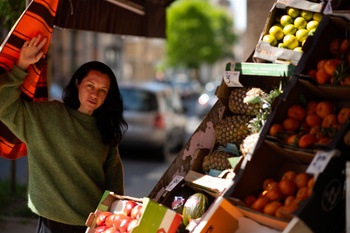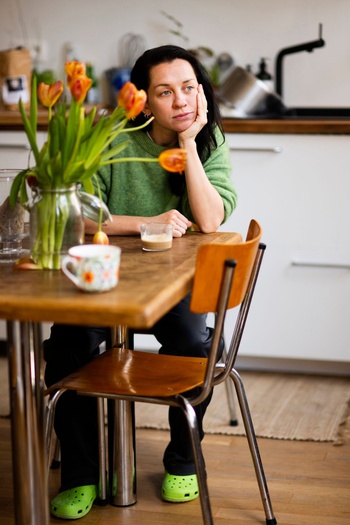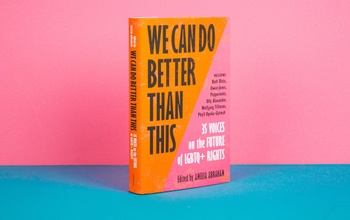These days, Amelia Abraham is being haunted by the ghost of a lesbian nun – a character in her forthcoming first novel. But at Passa Porta, the writer and editor who recently swapped swinging London for a flat in Vorst/Forest, conjures up a different vision. For We Can Do Better Than This, she assembled 35 powerful LGBTQ+ voices for their take on what it means to be queer today and what it hopefully will mean tomorrow.
© Ivan Put
AMELIA ABRAHAM?
Born in London in 1991
Starts as a journalist for the likes of Vice, Dazed, Vogue, The Guardian and The Observer
Does a Tedx Talk called “Why feminists should support transgender rights” in 2018
After a break-up, she sets out on a journey through LGBTQ+ culture and writes Queer Intentions (2019)
In 2021, she edits the book We Can Do Better Than This, and moves to Brussels, following a residency at Passa Porta
Is writing her first novel, about a woman who gets possessed by the ghost of a lesbian nun
“With Brussels I kind of did a soft launch,” Amelia Abraham says about her move from her London home to a flat in Vorst/Forest almost a year ago. A move for love, the second time around. “Though I would like to point out that there are six years apart between the moves. (Laughs) When I left for Ísafjörður, Iceland in 2016 to be with my girlfriend who I had met six months previously, I told everybody. So it was extra awkward when I came back home a week and a half later, crying on an easyJet flight because we had broken up after ten days. This time, I waited six months to see if things worked out before I told my friends, and they went: ‘What, you live in Brussels?’ They hadn’t even noticed I was gone!”
Those same friends were asking themselves if Amelia Abraham was going to write another book: “‘One that opens with you crying on the Eurostar home from Brussels?’” It sounds harsh, but Amelia Abraham can handle a bit of teasing, not the least because the break-up with her Icelandic girlfriend Salka in 2019 proved to be fuel for a book that may count as a benchmark for the contemporary queer experience, and might even be up for a television adaptation. Queer Intentions. A Personal Journey through LGBTQ+ Culture was a way for the journalist who is now working on her first novel – “a dark comedy about a woman who goes on an Eat Pray Love kind of post-break-up trip to Italy and gets possessed by the ghost of a lesbian nun; think Call Me by Your Name meets Black Swan” – to find a space for herself in a larger community which never before has been as present in the mainstream as it is now. “On the one hand, we have a desire to live differently, to say ‘fuck you’ to tradition, to mainstream visibility, to the institutions that have rejected us for so long; and on the other, we long to feel accepted, to find legitimacy in the mainstream, even if just for our own safety or happiness,” Amelia Abraham writes. She wondered: How do I feel about marriage? What happens to queer culture if we all start living like straight people? Is increased acceptance always a good thing? And who gets left behind? What in fact are we fighting for? To be different or to be like anybody else?
There is a disconnect between paper rights and how people actually feel and what they experience. Rights are important but they don’t necessarily equate to safety or happiness. So it doesn’t stop there
The conclusion of that journey along so many stories of different people across the LGBTQ+ spectrum – from Britain’s first groom and groom and the world’s biggest drag convention in Los Angeles to trans activists in New York and Syrian refugees in Turkey’s underground LGBTQ+ scene – is that you must have the choice, but that you don’t have to choose. That you can be many things at once, and that you can get there on shaky legs and with a broken heart.
FAKE CROCS
It is those shaky, ever doubting legs, which today stand in fake Crocs – “I wouldn’t want to trade them for the real deal!” – that make Queer Intentions such a ruthlessly important book. That most human trait of not knowing and failing along the way opens the door to empathy, inclusion, humanity.
Nuance has been a driving force in Amelia Abraham’s writing since she began her career as a journalist for publications such as Vice, Dazed, Vogue, The Guardian and The Observer. “I’m a people person, so writing seemed like a great way to meet people, to try to understand them and to tell their stories. That was what appealed to me. I have a lot of opinions, but I wouldn’t say that I have a real strength of conviction behind them. I like to think that I’m open-minded. So while I do admire writers who have a strong sense of conviction and are more polemical, the kind of writing that feels most natural to me is writing that deals in nuance.”

© Ivan Put
Although you need a foundation to build on. You can doubt whether you want to marry, but you should at least have the right to choose to. Today, that right is there – since 2003 in Belgium, since 2014 in the UK – but behind this paper evolution Amelia Abraham sees a reality that is anything but rosy, with two out of three LGBTQ+ people not feeling safe holding hands with a partner in public, hate crimes against gay and lesbian people in the UK doubling and recorded offenses against trans people tripling between 2014 and 2019, half of LGBTQ+ people in Britain reporting to have experienced depression in the last year and one in four trans people in the UK having attempted suicide while nine in ten have thought about it. “Most people in the LGBTQ+ community have experienced some form of discrimination,” says Amelia Abraham. “I have as well, though overall I have not had it too bad. When I first came out, it was as bisexual, and there was the usual kind of biphobic remarks from my parents, things like ‘It might be a phase’ or spending ten years calling any girlfriends my friend. These small little things that said out loud can be quite hurtful. And then there were some fetishising remarks or strange aggressions on the street in response to same-sex affection.”
“It does make me quite angry, but I’m more affected by other people’s stories. Like those of LGBTQ+ people in countries across the world that do not even recognize them and criminalize homosexuality or being trans. Or, closer to home, the stories of kids under 16 in the North of England having Coke cans thrown at them when walking down the street holding hands. Or the rise of transphobia in the UK media that has moved from the ‘outing of trans people’ and personal attacks towards targeting trans people as a group and an ‘ideology’.”
SAFE TO BE ME
Or, recently, the refusal of the Boris Johnson administration to include trans people in its ban on conversion therapy, causing more than 100 organisations to pull out of what was to be the UK’s first-ever international LGBTQ+ conference “Safe To Be Me”, scheduled to take place in London in June. “The UK is falling behind on other countries in many ways. We have terrible records for trans rights, intersex surgeries are still legal, we don’t have a third gender option on passports like you have here, we don’t have legal recognition of nonbinary people, and the reform of the Gender Recognition Act (an Act of the UK Parliament that permits people who have gender dysphoria to change their legal gender, ed.) never really happened.” As if people should be happy with the concessions made and not ask for too much. “That’s how many people perceive it, yes. Me too. (Sighs) I don’t know what goes through Boris Johnson’s head. But what do you expect from a man who once called gay people ‘tank-topped bum boys’?”

© Ivan Put
“The essence is that there is a disconnect between paper rights and how people actually feel and what they experience. Rights are important but they don’t necessarily equate to safety or happiness. So it doesn’t stop there. And in Britain, it kind of has.”
“As a consequence, I see a lot of anger in the UK right now,” Amelia Abraham continues. “And anger has its historical significance. Movements like the Gay Liberation Front in the UK or Act Up (AIDS Coalition to Unleash Power, ed.) were driven by it. Today you can see the same kind of energy at London Trans + Intersex Pride for instance, and rightfully so. That manifests in a march that feels very passionate and political, with a real sense of solidarity and direct demands for change.”
Those are exactly the things Amelia Abraham finds missing from the annual Pride. “I think it has lost its political meaning, its grassroots energy and its sense of community and inclusivity. London Pride has so much participation by pinkwashing brands that it feels like one big Super Bowl ad break. Of course it is better than those places in the world where no corporation will ever sponsor Pride because it’s bad for their reputation, but I still think Pride is a distraction from the fact that things aren’t actually so advanced.”
LGBTQ+ culture isn’t always colourful parades and rainbow flags. Sometimes we need to be permitted to not be funny and entertaining, to not be all glittery and colourful. Sometimes we’re just serious and angry
That glimpse beneath the thin surface, where written rights and enthusiastic acceptance collide with the everyday experience of so many people, is what prompted publisher Vintage to ask Amelia Abraham to edit the book We Can Do Better Than This, “angrier in tone, more demanding or direct. I think. I hope so anyway.”
THE BODY, A BATTLEGROUND
We Can Do Better Than This features 35 stirring, at times brutal reflections, ambitions and demands to allow the global community of LGBTQ+ people to move forward. Those 35 stories on a broad variety of topics – from safety, visibility, health and social care to community and organizing – represent a myriad of voices, backgrounds, races, religions, genders and sexualities. From former Gossip lead singer and now solo artist and actress Beth Ditto, photographer Wolfgang Tillmans, Belgian model Hanne Gaby Odiele, Years & Years frontman Olly Alexander and Brazilian Grammy award-winning drag queen Pabllo Vittar to grassroots activists like Boys of Bangladesh member Mazharul Islam, Peppermint, Queer Youth Uganda founder Leticia Opio and co-founder of UK Black Pride Phyll Opoku-Gyimah, among many others.

We Can Do Better Than This features essays that are extremely painful, that deal with murder, violence, depression, that stir up deep emotions, but that are hopeful as well. We are able to do better than this, we need to do better than this. In Riyadh Khalaf’s essay, we can read about how broader society can become an ally. But we also need to read about Tom Rasmussen’s drag alter-ego Crystal who only exists behind closed doors, about the murdered friends of Mazharul Islam and his escape from Bangladesh, about Beth Ditto’s invisible bodies. “It’s really important that people realize the horrific things that are going on in the world. LGBTQ+ people are often visible in culture as a form of entertainment, just think of Pride, RuPaul’s Drag Race or the funny gay best friend character. But LGBTQ+ culture isn’t always colourful parades and rainbow flags. Sometimes we need to be permitted to not be funny and entertaining, to not be all glittery and colourful. Sometimes we’re just serious and angry. I think the 2020 Black Lives Matter protests were a true inspiration to spur LGBTQ+ people to also take action.”
NOW WHAT?
Because it is important. “I just want to see queer people being human, not constantly living their fucking oppression all the time,” Beth Ditto writes in her essay “The ‘Visibility’ We Still Don’t See”, while Bobbi Salvör Menuez expresses “the desire to be seen as real”. “In the UK and in the US, LGBTQ+ people and particularly trans and nonbinary people have become such a talking point that they’re almost abstracted away from their own humanity. They have become a culture war issue. They exist in the public consciousness as a representation of an ideological shift rather than as a human.”
Thus an individual becomes a collective, a body an entire, hyper-diverse community. “Exactly, the body becomes an ideological battleground for conversations and debates about society which obviously has negative effects, it can make life unsafe for queer people. But it can also be positive in that the very existence of queer people can help to push society forwards. Travis Alabanza’s essay ‘Everyone’s Trans, Now What?’ captures that incredibly well. What if we started to see everyone as trans? Where would we go? What would be different? Would there still be sexism? I think there is a lot of great potential in that thought experiment. People are going to change, are going to evolve and that’s how we move forward as a species. Trans people might be at the frontiers of that evolution.”
AMELIA ABRAHAM
Writing for LGBTQ+ Rights: 4/5, 20.00, Passa Porta, www.passaporta.be
We Can Do Better Than This: Vintage, 340 p.
Site / Instagram
Read more about: Expo , Amelia Abraham , We Can Do Better Than This , Queer Intentions